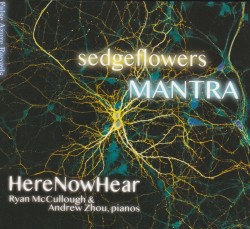 sedgeflowers MANTRA
sedgeflowers MANTRA
HereNowHear
False Azure Records FAR no.2 (falseazurerecords.com/2024/12/06/no-2-sedgeflowers-mantra)
Aleatory approaches to art, where chance and randomness play a central role in determining the outcome and direction of an object (material, musical or otherwise), is a 20th-century creative technique that found legs in literature (the cut-up technique of William S. Burroughs and John Lennon), as well as music (perhaps most famously associated with John Cage’s Music of Changes). Said technique is also associated with the German composer Karlheinz Stockhausen. Often, however, his work utilizing this method is overshadowed by his seminal electronic compositions (Studie I and Studie II) that have made a more pervasive cultural impact, influencing everyone from Aphex Twin, Thurston Moore and Sonic Youth, Miles Davis, Frank Zappa and the Grateful Dead.
What is sometimes lost in the application of the labels “controversial,” “modernistic” and “groundbreaking,” that are so often attached to Stockhausen’s output, is the fact that many of his pieces are also beautiful, accessible and imminently listenable. This is particularly so when performed by the talented young piano duo of American Ryan MacEvoy McCullough and Canadian Andrew Zhou. Recording for False Azure Records at various points between 2018 and 2022, this newly released album pairs Stockhausen’s famous 1970 Mantra (which utilizes a 13-note tone-row) with two new “companion” compositions by John Liberatore and Christopher Stark, for a satisfying listening experience.
With McCullough and Zhou doing double-duty on both piano and various cymbals and hand percussion instruments, this beautifully recorded and mixed double-CD offers a welcome introduction for anyone interested in the music of Stockhausen, or in the exciting new talents of these fine pianists.



